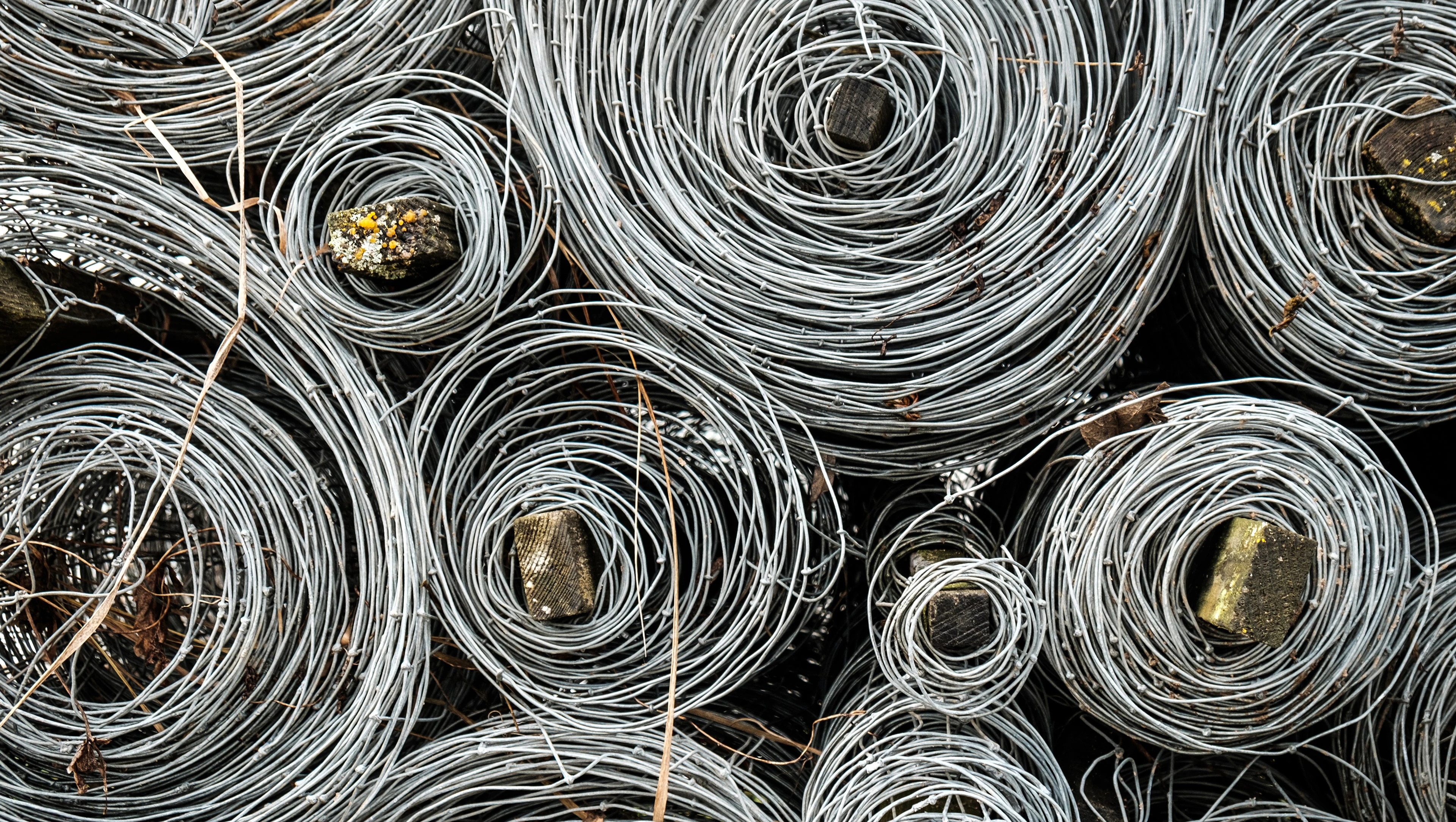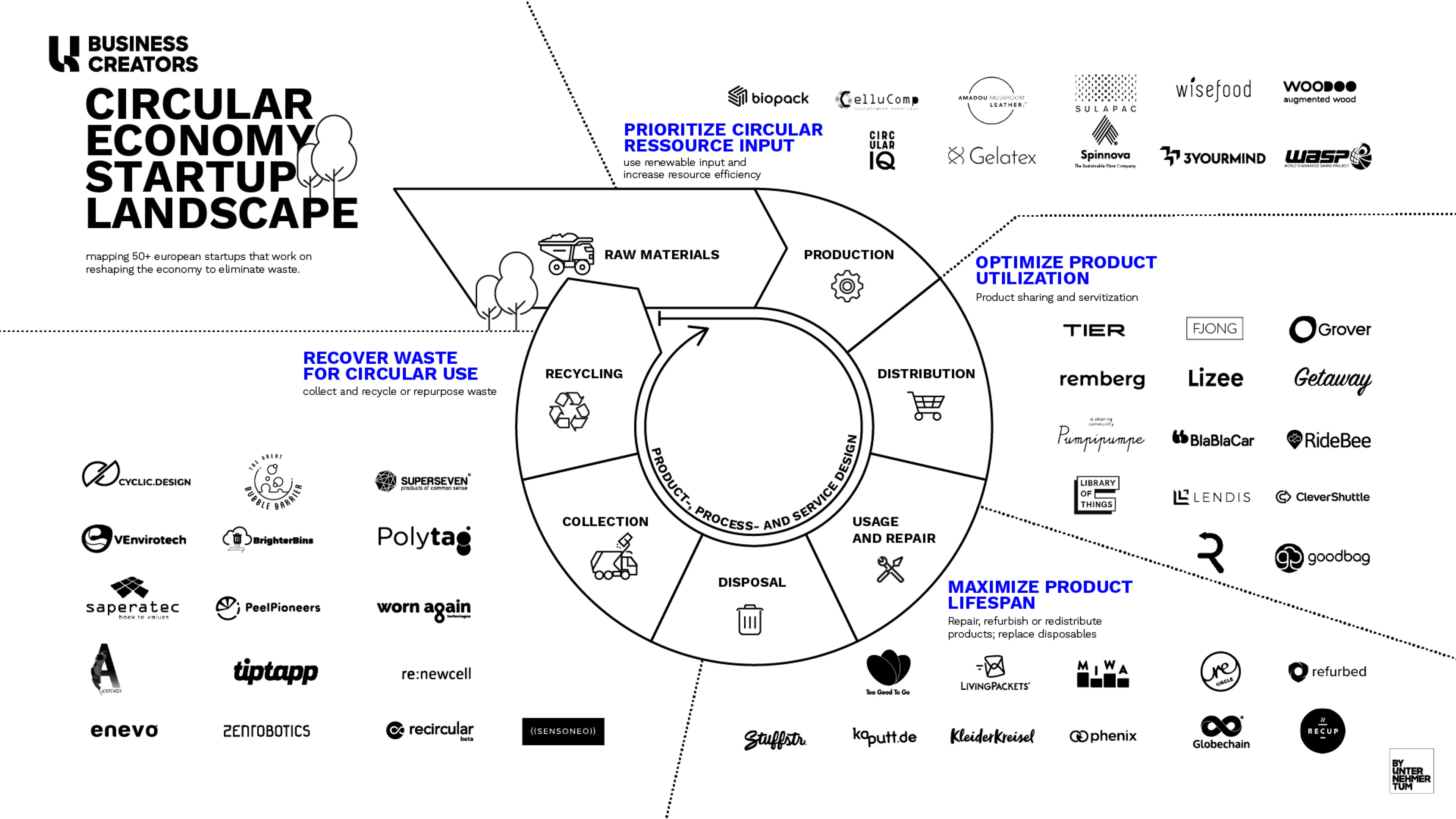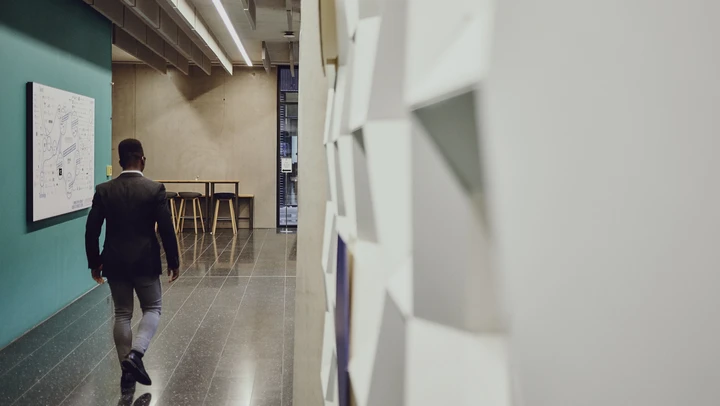
With the climate crisis - and how companies contribute to it - becoming more present in discussions, the discourse around a circular economy has gained momentum.
A circular economy is based on the principles of designing out waste and pollution, keeping products and materials in use, and regenerating natural systems.
Definition by the Ellen MacArthur Foundation, global thought leader on the topic
We believe that fostering sustainable innovation in established companies plays a big part in shaping the world we want to live in - especially today, in times of Covid-19. The consequences of the virus are wide-ranging, impacting not just health care systems but also economies and businesses.
Making the shift to a world of effective use and a lower import of raw materials is important. That’s why we identified 50+ start-ups with innovative and promising ideas to make the economy more circular – potentially inspiring your business, too. As collaboration is one of the key success factors when innovating and striving for impact, our consultants highlighted start-ups that can support organizations to transition to a cradle-to-cradle model.
Start-ups That Close The Loop
In our analysis, we defined four broad strategies to make businesses more circular - mapped along a typical value chain:
- prioritize circular input
- optimize product utilization
- maximize product lifespan
- recover materials for circular use
The classification is often not black and white. Many start-ups follow more than one strategy, so we categorized them based on their main impact. The design of the product, process, and service are important elements of each strategy, stretching along the whole value chain.

Start-ups, arranged according to the four strategies for a circular economy
1. Prioritize Circular Input
This concerns mainly the first stages of the value chain, e.g. selecting input material and transforming it into the final product.
- We found that many start-ups are creating new materials to replace existing, non-renewable input. Examples are Amadeo Leather producing vegan leather based on mushrooms, or wisefood, offering an alternative to single-use plastic straws made out of by-products of the apple juice production. These start-ups are usually heavy in research and development (R&D) and often university spin-offs, such as Spinnova. The idea to create a process that converts pulp into textile fiber without harmful chemicals was brought to life in the Biomaterials research area of the Technical Research Centre of Finland.
- A second option is to increase resource efficiency, for example through additive manufacturing techniques. Start-ups such as 3YOURMIND enable companies to transition to and scale 3D printing, reducing the amount of material needed for the final product. Another example is Wasp. Their mission is to 3D print houses with renewable materials found on-site - a zero waste approach.
2. Optimize Product Utilization
Here, we tackle the distribution and usage of items. The aim is to reduce idle time of products and assets.
- This strategy is often pursued through creating new business models, as with the current trend of servitization. For users, this means that they move from owning a product to renting, while the provider makes sure that it delivers its value over the rental period. This is already offered in many fields such as clothing (FJONG), consumer electronics (Grover), or even everyday products (Library of Things). Examples of start-ups that enable established companies to make the switch to a Product-as-a-Service model are remberg, whose solution is geared towards manufacturers, service providers, and operators of industrial machinery, or Lizee, a logistics and managed services solution for brands which want to rent items instead of selling them.
- Another business model to tackle unutilized product capacity comes from start-ups that enable owners to share their products with others, such as cars (Getaway), rides (Ridebee), or everyday items (Rnters).
3. Maximize Product Lifespan
First, this involves designing reusable products to replace disposables. Secondly, it’s about recirculating products that their owners don’t need anymore.
- Start-ups have found creative ways to increase product lifespans by replacing disposables (“precycling"). Examples are LivingPackets, offering a connected, reusable delivery box, or Recup, a deposit system for reusable coffee-to-go cups.
- There are platforms enabling redistribution, such as kleiderkreisel which allows owners to sell their used clothes or TooGoodToGo where consumers can buy unsold food from a variety of shops and restaurants. Other start-ups take back used products to repair, refurbish, or upgrade them and sell them to new customers. This has gained a lot of momentum with customer electronics (refurbed).
4. Recover Materials for Circular Use
This involves all steps taken after a product has been “disposed of” in the traditional sense. Ideally, the recyclability of a product is already taken into account during its design.
- The first lever by which waste can be reused is by collecting it – either at the end of a product’s lifetime or during manufacturing, when by-products accrue. Start-ups do so by making bins smart, for example (Enevo), or by analyzing and sorting waste (Zenrobotics). Polytag marks newly produced items with a code that will later help consumers to determine how to recycle its components.
- Other start-ups are working on new ways to turn waste into reusable material. Saperatech has developed a process to separate all raw materials from composite products. Worn Again has developed a technology to turn non-reusable textiles as well as PET bottles and packaging into new garments. Waste is also being used in new fields: Aeropowder turns feather waste into bio-composites. Recycled materials that form the basis for new products are closing the loop of a circular economy.
With this outline of circular strategies, we want to inspire both established organizations and start-ups to benefit from and participate in the transition to a circular economy.*
Do you want more information on how to develop and implement innovative products, processes, and business models? Or are you looking for a way to leverage collaboration with start-ups? Please reach out to us at UnternehmerTUM Business Creators:
- Susanna Mur, Consultant, UnternehmerTUM Business Creators
susanna.mur@unternehmertum.de - Christian Mohr, Partner, UnternehmerTUM Business Creators
christian.mohr@unternehmertum.de
* Our start-up landscape here is not meant to be exhaustive. If you're a start-up and would like to be included, please contact us.























